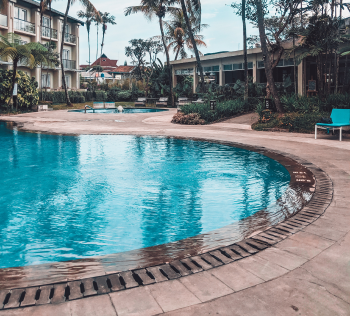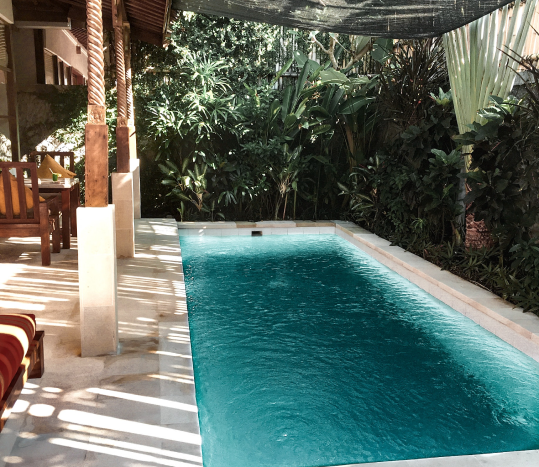Slip ratings for tiles refer to their slip resistance, which indicates how slippery or non-slip a tile surface is. Slip ratings are especially important in areas where there is a potential for wet or slippery conditions, such as bathrooms, kitchens, swimming pool decks, or outdoor areas.
See what the Volare Tiles experts have to say about slip ratings below.

There are various methods and rating systems used to determine slip resistance, but one commonly used system is the "R" rating, also known as the “pendulum test value” (PTV) *scroll further down to learn about Pendulum Test*. The R rating scale typically ranges from R9 to R13, with higher values indicating a higher slip resistance. Here's a general breakdown of the R rating scale:
R9: Low slip resistance. Suitable for dry areas with minimal risk of slipping, such as residential interiors.
R10: Moderate slip resistance. Suitable for areas where occasional wetness or contamination may occur, such as domestic bathrooms or changing rooms.
R11: Slightly higher slip resistance. Suitable for areas that are frequently wet, like commercial kitchens or laundry rooms.
R12: High slip resistance. Suitable for areas subjected to water spillage and where increased slip resistance is required, such as swimming pool surrounds or outdoor areas.
R13: Very high slip resistance. Suitable for areas exposed to extreme conditions, including areas with continuous water or oil exposure, such as industrial kitchens or food processing areas.

It's important to note that slip ratings may vary depending on the manufacturer and the specific tile type. It's recommended to consult with the tile manufacturer or supplier to obtain accurate slip resistance information for a particular tile product. Additionally, local building codes or regulations may specify minimum slip resistance requirements for different areas to ensure safety.
If you need a specific tiles slip rating, please feel free to contact the Volare Tiles + Flooring team, with the name of the tile and we’ll be happy to help.
Tile slip ratings are important to consider for couples making a decision in the home or an architect making large scale considerations to commercial projects.
Safety: Slip-resistant tiles help reduce the risk of accidents and injuries caused by slips and falls. Areas that are prone to wetness, such as bathrooms, showers, kitchens, or pool decks, can become hazardous if the tile surfaces are slippery. Slip-resistant tiles provide better traction, allowing people to walk or move around with reduced chances of slipping.
Compliance with Regulations: Building codes and regulations often require specific slip resistance standards to be met in certain areas. For instance, public buildings, workplaces, or commercial establishments may need to adhere to specific slip resistance requirements to ensure the safety of employees, customers, or visitors. Compliance with these regulations is crucial for legal and liability reasons.
Duty of Care: Property owners or managers have a duty of care to provide a safe environment for occupants or users of their premises. Installing slip-resistant tiles in areas prone to moisture or spills demonstrates a proactive approach to safety and fulfils this duty of care.
Peace of Mind: Slip-resistant tiles provide peace of mind to individuals using the space, particularly in environments where slip accidents are more likely to occur. Whether it's a homeowner concerned about their family's safety or a business owner seeking to protect customers, choosing tiles with appropriate slip ratings can help alleviate worries and ensure a secure environment.
Versatility: Slip-resistant tiles are not limited to wet areas. They can also be beneficial in locations subject to oil or grease spills, such as commercial kitchens or workshops. Choosing tiles with suitable slip ratings ensures that the surface remains safe and slip-resistant even in challenging conditions.
Overall, tile slip ratings play a crucial role in preventing accidents, complying with regulations, and promoting safety in various settings. They provide a standardised way to assess and communicate the slip resistance of tiles, allowing individuals to make informed decisions and create safer living or working environments.

A pendulum test measures the dynamic coefficient of friction (CoF) between the tile surface and a standardised rubber slider. The test involves the use of a pendulum apparatus equipped with a rubber slider that swings across the tile surface.
Here's a general overview of how the pendulum test for tiles works:
Pendulum Apparatus: The pendulum apparatus consists of a pendulum arm with a rubber slider attached at the end. The rubber slider mimics the contact between a human foot and the floor surface.
Calibration: Before conducting the test, the pendulum apparatus is calibrated to ensure accuracy. The apparatus is adjusted to have a specific impact energy level, usually within the range of 50 to 70 Joules.
Tile Surface Preparation: The tile surface to be tested is cleaned and levelled to remove any contaminants or irregularities that could affect the test results.
Pendulum Swing: The pendulum arm is released, and the rubber slider makes contact with the tile surface, simulating a foot striking the floor. The pendulum swings across the tile surface and comes to a stop due to friction.
Measurement: The distance travelled by the pendulum after contact with the tile surface is measured. This distance is known as the "pendulum test value" (PTV) and is an indicator of the tile's slip resistance.
Repeat Testing: Multiple tests are typically conducted at different locations on the tile surface to account for variations in slip resistance across the area.
Slip Rating Determination: The PTV obtained from the pendulum test is compared to a slip rating scale, such as the R rating scale. The slip rating provides an assessment of the tile's slip resistance and helps classify it accordingly.
The pendulum test is an internationally recognized and standardised method for evaluating slip resistance. It provides objective and repeatable results that help inform the selection of tiles with suitable slip resistance for different environments.
Speak to a Volare flooring and interior design expert for free via video to discuss your project and to be guided through tile and flooring ranges you may be interested in.
Book your free online design consultation here.Volare Tiles + Flooring are committed to supplying Australians with top quality, attractive, modern and cost effective wall and floor tiles.
RICHMOND showroom location details CANBERRA showroom location details GEELONG showroom location details